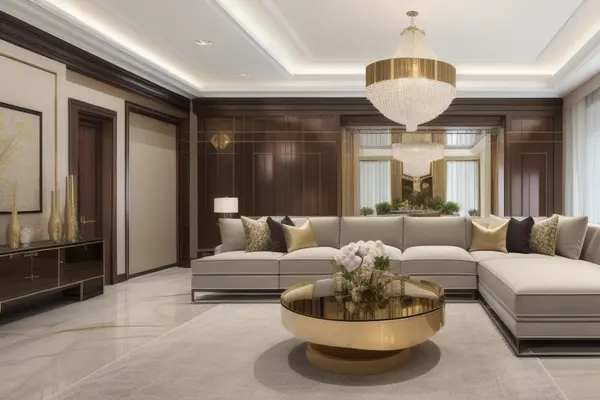Table of Contents:
Introduction to Luxury Home Sales Trends
As we delve into the world of luxury home sales, it is essential to familiarize ourselves with the dynamic trends that define this opulent sector. Luxury home sales trends are an intricate web of factors that bring together economics, lifestyle choices, design preferences, and much more. Staying updated with these sways can be a game-changer for both buyers and sellers in the luxury real estate market. Today's article illuminates the latest and most impactful trends shaping luxury home sales, and why understanding them can elevate your real estate game.
The Rising Popularity of Smaller Luxury Homes
One of the surprising luxury home sales trends that has taken off recently is the attraction towards smaller luxury homes. Gone are the days when luxury meant owning an ostentatious mansion sprawled over countless acres. Instead, high-end buyers today are seeking more compact, efficient, and manageable spaces that still deliver on luxury.
These smaller homes offer the same high-end finishes, state-of-the-art appliances, and luxurious amenities found in more extensive properties. But, they provide it all in a tightly curated, more sustainable package. What's more, they're often in desirable locations, whether it be city centers or beautiful coastal areas.
This growing preference is fueled by multiple factors. First, there's the increasing importance of environmental sustainability, with smaller homes typically having a smaller carbon footprint. Secondly, the change in lifestyle has made people prioritize location, convenience, and ease of maintenance over sheer size. As a result, we are witnessing a steady surge in smaller luxury homes sales.
Pros & Cons of Luxury Home Sales Trends
| Trends | Pros | Cons |
|---|---|---|
| Smart Home Tech | Increases property value | Can be expensive to install |
| Eco-friendly Design | Lower utility bills, potential tax benefits | Upfront costs can be high |
| Open Floor Plans | Aesthetic appeal, potentially higher resale value | Lack of privacy |
| Luxury Condominiums | Amenities, less maintenance required | HOA fees, less privacy |
Luxury Real Estate Market Outperforming Lower Price Segments
Another noteworthy development in recent luxury home sales trends is the robust performance of the luxury real estate market, even outpacing the lower price segments. This strength is grounded in a few key reasons.
Firstly, luxury home buyers often have substantial financial reserves, making them less susceptible to economic downturns. They can afford to invest even when others are pulling back. Secondly, the exceptional features and locations of luxury homes continue to attract buyers despite turbulent market conditions.
Furthermore, in some regions, the luxury market is fueled by international buyers seeking secure investments or desirable travel destinations. All these factors combined have given the luxury real estate market an edge, allowing it to outperform in various circumstances.
However, while the luxury sector thrives, it's essential to remember that real estate markets can be highly localized. Conditions vary greatly depending on the region, the specific segment of the market such as condos, single-family homes, townhouses, and the price point.
Increase in International Property Purchases
One prominent facet of the current luxury home sales trends is the rise in international property purchases. Globalization and the continued growth of wealth in various parts of the world have played an instrumental role in promoting cross-border luxury home sales.
An increasing number of buyers, particularly from booming economies, are looking beyond their borders for luxurious properties that serve as investment assets, holiday homes, or even primary residences. The United States, with its diverse property market and stable economy, has emerged as a major hotspot for these international luxury home buyers.
However, these purchases aren't limited only to certain countries. From the stunning beachfront villas in Spain to the elegant penthouses in Singapore, global buyers are exploring luxury real estate in different corners of the world.
It's important to note that these international transactions often entail complex legal and financial considerations. Therefore, international buyers typically require expert guidance from real estate professionals with a deep understanding of local laws and regulations.
Rising Prices in Luxury Real Estate Markets
The upward trajectory in the prices of luxury real estate is another pivotal element in the changing luxury home sales trends. From big cities to smaller markets, luxury properties' prices have been escalating, demonstrating the persistent demand in this sector.
Several factors contribute to this incessant rise in prices. This starts with the unique and attractive features luxury properties often offer - exclusive locations, extraordinary designs, high-end amenities, unparalleled privacy, among others. Further adding to this is the limited supply of such distinctive properties, strengthening the price surge.
Besides these, inflation and the ongoing rise in building and labor costs have also played their part. They've made the construction of new luxury homes more expensive, which invariably gets passed onto the selling price.
However, while rising prices indicate a thriving market, they also present challenges. Potentially higher property taxes and the potentially significant impact of economic downturns are a few to mention.
Cash Transactions in Luxury Real Estate
Delving deeper into luxury home sales trends, we come across the dominant role played by cash transactions in this market segment. While it may seem surprising to some, cash deals are quite common when it comes to high-end properties. The simplicity and swiftness of cash transactions, that bypasses the bureaucratic hiccups of traditional bank financing, is a favored choice for affluent buyers.
Cash offers often hold an upper hand in a competitive market scenario. They not only speed up the sales process but also cut out the risk of a deal falling through due to loan problems. Additionally, they often have more negotiating power as they present minimal risk to the sellers.
However, the prevalence of cash transactions doesn't imply that luxury home buyers do not avail financing options. A well-tailored loan can also be a strategic option for buyers who wish to maintain their liquid assets for other investments. Therefore, understanding this financial side of the luxury home sales is crucial for buyers as well as sellers in the luxury real estate market.
The Impact of Rising Interest Rates on Luxury Home Sales
When talking about luxury home sales trends, it's impossible to overlook the potential impact of rising interest rates on this market. Interest rate hikes can create waves of concern among potential buyers as the cost of borrowing money for luxury home purchases increases, potentially slowing down the buying process.
However, the dynamics of the luxury real estate market can be resilient. Unlike the lower-priced markets, luxury home purchases are, at times, less dependent on mortgages and more often funded by the buyer's personal wealth. This implies that even with the headwinds of rising interest rates, the luxury home sales market might not witness a substantial slowdown.
Nevertheless, any change in interest rates can create market uncertainty, influencing the decision-making of potential buyers. As such, closely monitoring these economic indicators and trends becomes an imperative task for those involved in the luxury real estate world.
The Growing Trend of Second Homes and Co-Ownership Models
Diversifying one's property portfolio through second homes and exploring alternative ownership models, like co-ownership, has emerged as a significant aspect of recent luxury home sales trends.
The concept of owning second homes in exotic locations or in bustling cities for holiday purposes or as an alternative investment has gained traction among luxury home buyers. Such properties not only provide the pleasure of a getaway home, but they also have the potential to appreciate in value over time or generate rental income.
On a similar note, the model of co-ownership is turning heads in the luxury real estate market. Basically, co-ownership offers a chance for several investors to collectively purchase and own a luxury property. With this model, the cost and responsibilities of ownership are distributed, making the purchase of high-end properties a reality for many who might not otherwise afford it.
However, it's worth noting that these trends come with their own set of challenges and considerations. From managing property maintenance to understanding the complexities of shared ownership, buyers must be prudent to ensure that their investment yields the desired benefits.
Investors Expanding Their Luxury Real Estate Portfolios
Another pivotal shift in luxury home sales trends is witnessed in the expansion of luxury real estate portfolios by investors. More and more investors now perceive luxury real estate not merely as a purchase for personal use but as a strategic investment move.
High-end properties, with their desirable locations and exclusive amenities, typically appreciate in value over time. This, coupled with the potential to generate rental income, creates a compelling case for investors to diversify their portfolios with luxury real estate.
Moreover, luxury properties often provide certain resilience against market fluctuations, making them an appealing addition for risk diversification within an investment portfolio. The international nature of the upscale real estate market adds another layer of allure for investors seeking geographical diversification.
However, investing in luxury real estate isn't without its challenges. From tax implications to property maintenance, investors must consider various factors to ensure that their foray into the luxury real estate market is profitable.
Conclusion: The Future of Luxury Home Sales Trends
In conclusion, the landscape of luxury home sales trends encompasses a vast and diverse array of elements. From the rising popularity of smaller luxury homes to the expansion of investors' luxury real estate portfolios, it's clear that the luxury real estate market is anything but static.
Staying ahead of these trends is not just crucial for individuals looking to buy or sell luxury homes, but it also provides valuable insights for investors, real estate professionals, and anyone with an interest in the real estate market.
As we look into the future, it's reasonable to anticipate that this market will continue to evolve, influenced by a multitude of factors ranging from economic conditions, lifestyle changes, to technological advancements. One thing is certain, though; luxury real estate remains a fascinating and rewarding realm full of opportunities for those who understand its workings and keep themselves updated with its dynamic trends.
Frequently Asked Questions About Luxury Home Sales Trends
What are the latest luxury home sales trends?
The latest luxury home trends are leaning towards more modern, efficient, and lavish home designs. The demand for seclusion is also increasing, resulting in a spike in sales of luxury homes in less populated locations.
How has the pandemic affected luxury home sales trends?
The pandemic has greatly affected the luxury home sales trends with a significant increase in desire for homes with home office spaces, high-speed internet, and spaces for recreation.
What is driving the demand for luxury homes?
The demand for luxury homes is being driven by the increased value homebuyers are placing on properties with privacy, comfort, and ample space for both living and working remotely.
What features are most desirable in luxury homes?
The most desirable features in luxury homes include state-of-the-art kitchen appliances, spacious outdoor living spaces, smart home technologies, wellness spaces such as gyms and spas, and lavish interior design.
Where are luxury home sales increasing the most?
Luxury home sales are increasing significantly in suburban areas and less densely populated locations due to the pandemic's impact on work lifestyles, which has shifted people's preferences towards more spacious and secluded homes.






